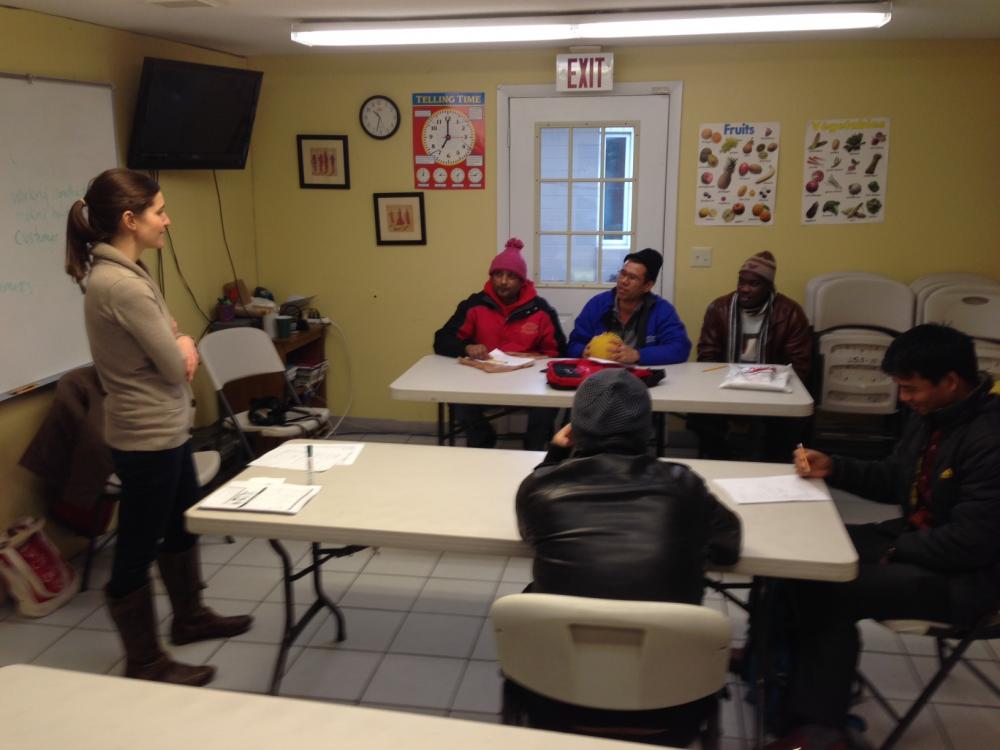Last summer, Springfield Mayor Domenic Sarno asked the federal government to stop settling so many refugees in his city. He argued they were taxing the city’s resources beyond what it could afford and weren’t receiving the help they needed.
Despite the mayor’s request, refugees from places like Bhutan, Somalia, and Iraq keep arriving. The differences they face in food, laws, and language can be dizzying. In addition, they often have to adapt to a very different work culture.
‘Very American thing to do’
Because finding a job is one of the key ways refugees assimilate and become self-sufficient, the State Department funds classes to help them enter the work force. Some of the classes are provided by Lutheran Social Services in West Springfield, which resettles refugees in the Pioneer Valley. Erika Mendelsohn, a teacher there, points out that just the American way of getting a job can be uncharted territory.
“A lot of these people are just trained in skills and they’re really good at tailoring or they’re really good at farming and then they just go and work at that job,” Mendelsohn says. “There’s not this whole process of filling out an application and going to the interview and trying to sell yourself. They don’t want to talk about how great they are because that’s a very American thing to do, I think.”
She has her students practice the language of self-promotion, learning words like “honest” and “punctual,” so they’re ready to sell themselves in a job interview.
Looking for work, and often finding it
There’s no shortage of refugees eager to work and build a new life here. From the fall of 2012 to the fall of 2013, 550 refugees settled in just three western Massachusetts communities: Springfield, West Springfield and Westfield. While the learning curve can be steep, more than 80 percent of refugees who arrived last year and were able to work found jobs with companies like Yankee Candle, Hasbro, Diana’s Bakery and the Sheraton Hotel.
K.C. Jones, who heads up human resources at the Sheraton, started hiring refugees five years ago. Jones began with a handful; now he has 17 working for him. He believes that the refugees bring in a great enthusiasm, which is very infectious. He adds that, “they’re hard workers and even though some of them may not have all the English skills, we still know how to communicate.”
One is the refugees Jones hired is named Chhali Thapa. She is 26 years old and arrived two years ago from a refugee camp in Nepal. She says that in the refugee camp there was no electricity, gas, or water supply. She had to get water from a nearby river. Now, she shares an apartment in Springfield with her husband, young daughter, and other family members. She calls her new life in the United States “luxurious,” and adds, “we have everything. Gas, electricity, water supply inside the home, hot water, cold water, everything.”
From refugee camp to top hotel
The Sheraton Hotel started hiring refugees like Thapa through Jewish Family Service in Springfield. Tatyana Abashina is an employment coordinator there and arrived as a refugee herself eighteen years ago. She believes those coming from refugee camps often have a lot more to learn than how to communicate.
“Hygiene is the biggest issue,” Abashina says. “You have to understand these people live without water, without enough clothes, without enough soap, shampoo.”
The issue became more clear to her a few summers ago when she got a call from a manager at the Sheraton, who said, “All my employees left except your only one employee…Everybody say they cannot stand him anymore. It’s a body odor [problem].”
With the help of an interpreter, Abashina explained the problem to the man. He thanked her for the lesson and two years later, all is well at work.
Abashina now makes a point of reviewing hygiene with refugees before they start a new job, and she’s found an effective way to drive the point home: You Tube. One of the videos Abashina shows refugees is called “Eliminate Body Odor Tutorial” and demonstrates how to apply anti-perspirant.
‘I want to buy a beautiful house’
Once the refugees get past the initial hurdles of a first job, the focus turns to moving into a better job. Chhali Thapa is studying to become a certified nursing assistant, and in addition to her work at the Sheraton, she’s a housekeeper at a nursing home in Holyoke. She says she wants a third job and adds that her husband has four jobs. Thapa’s goal is simple. “I want to buy a beautiful house,” she says. “I want to live happily.”
There will soon be more refugees sharing her goal. Next month, 40 or so refugees are expected to land at Bradley Airport and begin new lives in the Pioneer Valley.
